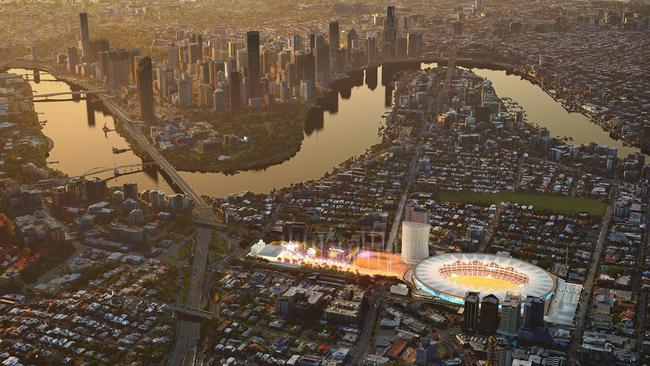Brisbane Olympic Games 2032: Jarrod Bleijie says 2032 organisers will avoid ‘glitz and glamour’ after Olympic bosses warning
Queensland Deputy Premier Jarrod Bleijie says politicians will be ‘stepping back’ on Olympic planning amid 100 day venue review.

Queensland’s new government has vowed to steer clear of the “glitz and glamour” of the Olympics after the International Olympic Committee reminded Brisbane organisers that they have to “respect” the various commitments made to secure the 2032 Games.
In a subtle shot across the bow at the Brisbane Games’ tardy start, and amid the new Liberal National Party government’s 100-day review of the Games masterplan, IOC executive director Christophe Dubi told The Australian there were two clear issues.
He said: “What really matters is to do the right thing from two standpoints: that the venue choices which are going to be made serve the long-term usage of the community from the elite athletes to community sports. At the same time it is immensely important that the promises made at the time (of winning the Games) to the IOC and in particularly to the international federations be respected.”
Brisbane was awarded the Games in July 2021 – a decision made more than 10 years out, and three years earlier than usual, to fit in with the South East Queensland strategy to develop transport links between the Sunshine and Gold coasts.
But those extra years have been frittered away with political indecision about the location of the venue for the opening and closing ceremonies and the athletics stadium. There is also a lingering question about the swimming venue and whether it will be a portable pool or a permanent facility.
Queensland Deputy Premier Jarrod Bleijie, the minister responsible for delivering Olympic infrastructure, told The Australian that politicians would be “stepping back” to let the newly appointed co-ordination authority deliver its 100-day review of Games venues.
“This is a big task, but the experts we’ve assembled in the Games Independent Infrastructure and Co-ordination Authority have already hit the ground running,” he said.
“The host announcement was made in July 2021 and the former Labor government squandered more than 1200 days because they were more focused on red carpets, glitz and glamour.
“Time is still on our side and we are implementing the plan that Queenslanders voted for to get the Games back on track.”
Bleijie said the government was “absolutely committed to a world-class Games, generational infrastructure, greater accessibility, a 20-year tourism plan and genuine legacy benefits that all Queenslanders can be proud of”.
At the time of wooing the IOC in 2021, a consortium of Brisbane and South East Queensland leaders presented a slick video with accompanying thick documentation about having a new stadium with a capacity of 50,000 in the “Albion Precinct”, a redevelopment of railway land in Brisbane’s north.
The IOC had added its own notes, suggesting that Carrara Stadium on the Gold Coast could be an alternative venue for track and field and a refurbished Gabba could then host the ceremonies.
By July of that same year Brisbane had assured the IOC that it would use existing and temporary venues wherever new permanent venues were not supported by a viable business plan that fulfilled the long-term needs of the local community. It had earmarked The Gabba as the relatively low-cost venue for track and field and the ceremonies because it was going to be refurbished anyway.
As for promises to World Athletics? That was for an athletics track that could be used to help develop the sport after the Games.
On the back of a 92-page questionnaire and additional document and promises, Brisbane was then awarded the 2032 Olympics.
A spokeswoman for Athletics Australia said the body would continue to “advocate for an approach that both provides a suitable venue to showcase our wonderful athletes and sport, and one that leaves a lasting legacy facility that will benefit athletics from the community level through to international competition standards”.
World Athletics president Seb Coe, one of seven candidates for IOC president when elections are held to replace Thomas Bach in March, has been pushing for a permanent venue to stage world-class athletics events and be an inspiration hub for coaching and administration after the Games.
The documents, as submitted by the Queensland bidders, said: “Once upgraded the venue (The Gabba) will feature: a minimum capacity of 50,000, making The Gabba the largest oval stadium in South East Queensland and best equipped to meet the requirements for the Games and to maximise ticketing revenues.’’
But the subsequent flip-flopping between the $2.7bn Gabba upgrade; a new $3.4bn stadium at Victoria Park or the $1.6bn upgrade to QSAC, or even the $6bn private-government partnership for Brisbane’s Northshore, has raised concerns that the advantage of time has been lost.
However, Dubi added: “We have really full trust in Brisbane 2032 (organisers) being a super partner to collaborate with the authorities and steer the whole process in the right direction.’’
In some good news for the Brisbane organisers, the IOC announced on Tuesday that global sponsorship for its Olympiad period from 2029 to 2032 had already reached $US6.2bn ($9.6bn).
“We think this is a good figure so far out and we’ve already got a large proportion of what we’d hoped to get,’’ IOC spokesman Mark Adams said. “We’ve created a good platform to get even more, particularly after a very successful Olympic Games in Paris.’’





To join the conversation, please log in. Don't have an account? Register
Join the conversation, you are commenting as Logout